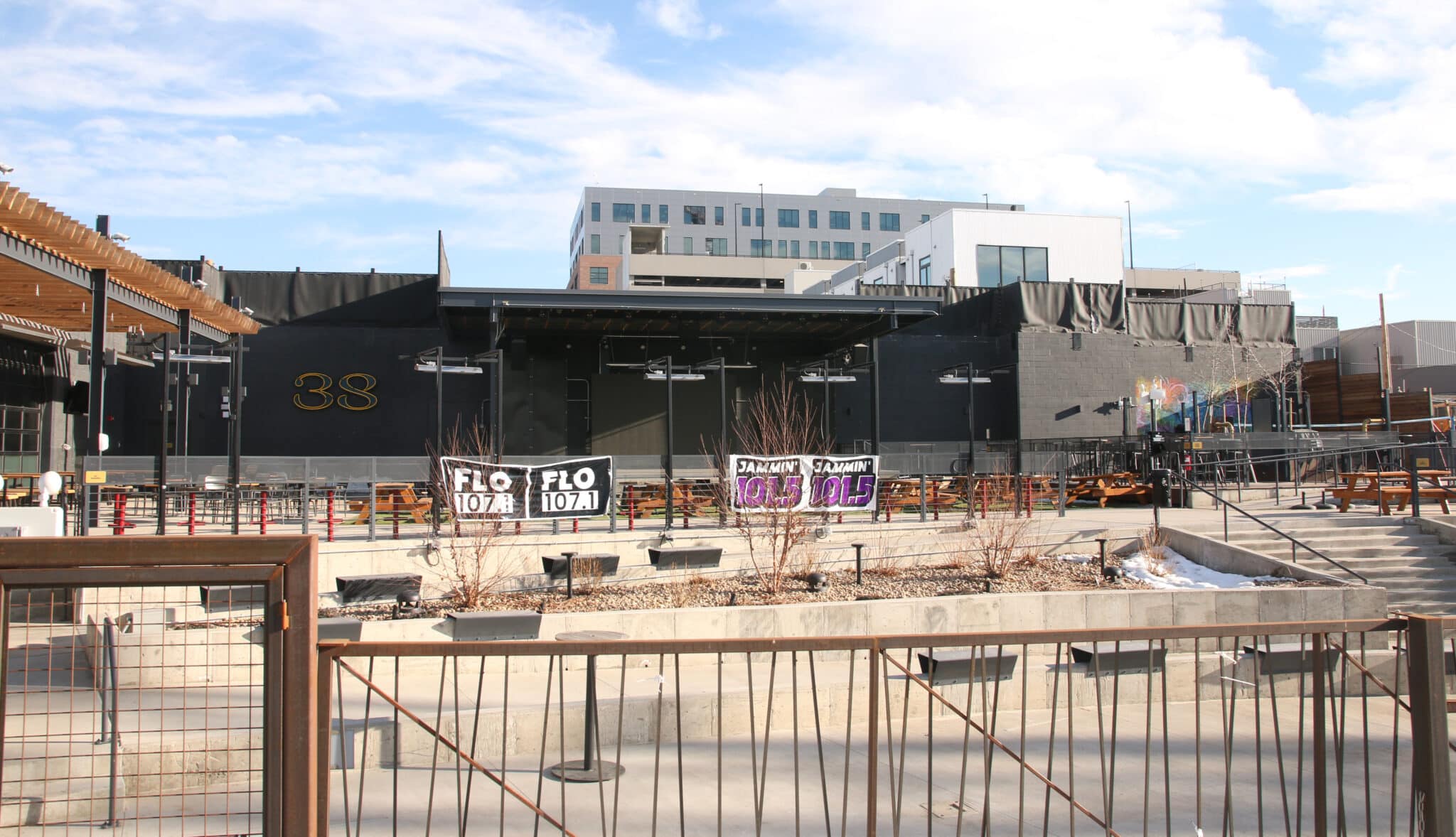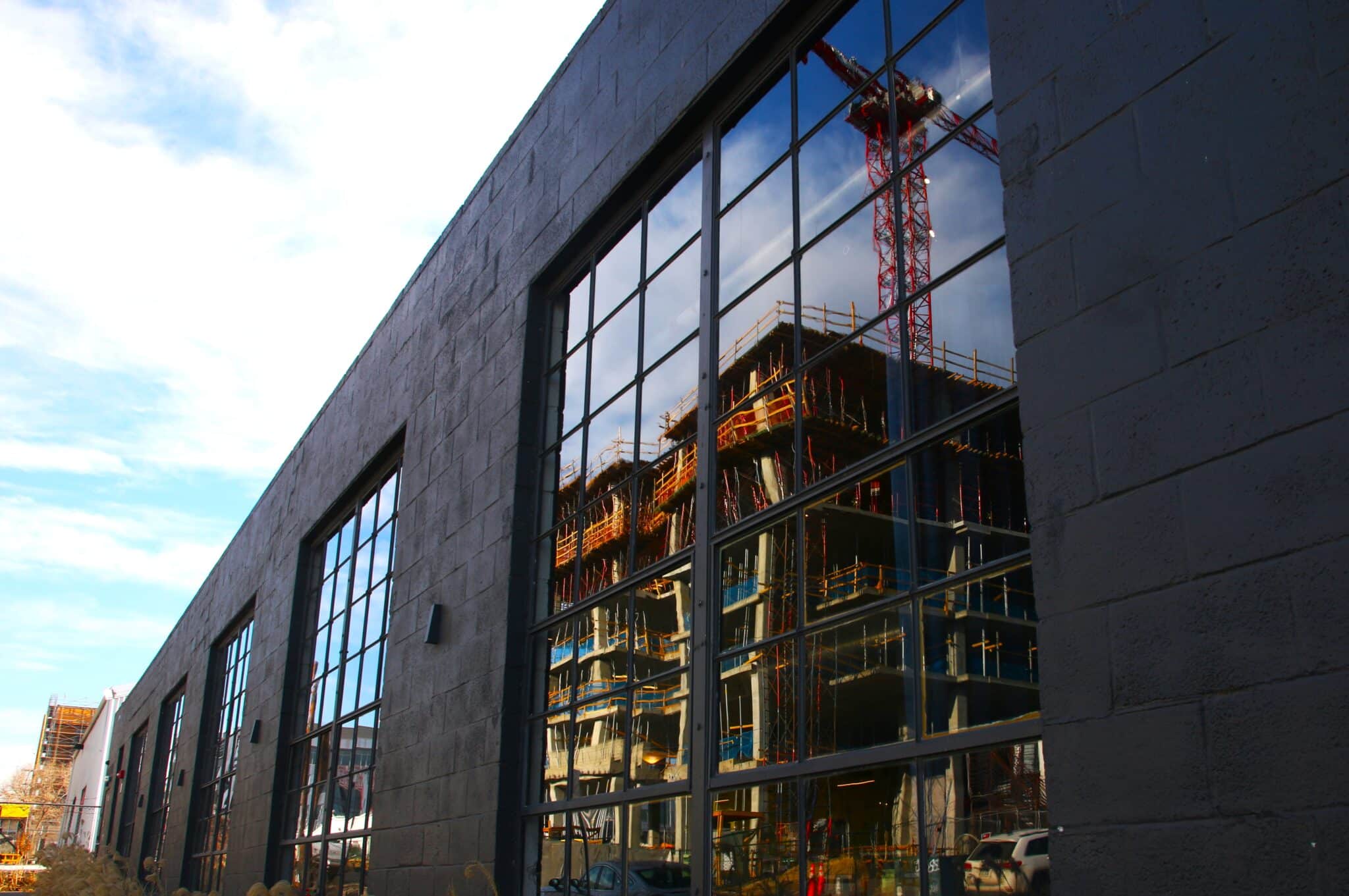
Number 38, which has a large outdoor patio with a stage, is located at 3560 Chestnut Place in RiNo. (BusinessDen file)
Denver’s licensing department has approved a compromise plan that it hopes will end two years of disagreements between the noisy RiNo venue Number 38 and annoyed neighbors.
The plan, signed by Excise and Licenses Director Molly Duplechian on Friday, will allow for live music at Number 38 until 10 p.m. After that, the venue at 3560 Chestnut Place must close its garage doors. It must also maintain a wall that it has built between it and residences.
“We are grateful to be able to continue to provide live music to our patrons,” owner Spencer Fronk said by phone Saturday. “We’ve never stopped playing music since we opened in October of 2020 and we never intend to. This order allows us to utilize the outdoor facility to its fullest and provide free entertainment outdoors on a daily basis.”
Number 38 has an 18,000-square-foot patio with a stage for live music. Across an alley are a handful of residences, and a 12-story apartment building is being built next door.
Some neighbors say the music there shakes the walls of their homes, which they moved into before Number 38 was built. They have urged the city to crack down on Number 38.

A construction project is reflected in the windows of Number 38. (BusinessDen file)
Last May, Duplechian limited Number 38’s live offerings to acoustic music only. A few months later, the city accused Number 38 of violating that restriction and Number 38 agreed to stop playing music altogether for six days in November as a punishment.
“It was a recipe for disaster out of the gate and it’s not surprising to me that we had some conflicts,” said Daniel Ritchie, a neighbor who has been critical of Number 38.
“If Number 38 would have originally reached out to us or responded to our requests for conversations, maybe we could have mitigated this up front, but here we are a few years later with at least a plan,” he said of Friday’s compromise. “I wish this plan had been in place on Day 1. It doesn’t take a rocket scientist to understand that this was a recipe for conflict.”
Ritchie said he and others are skeptical that Number 38 will stick to the plan and skeptical that the city will enforce noise ordinances there if they do not stick to the plan.
“I think the proof is going to be in the results. We have been told an awful lot of things over the past two years and those things have led us to where we are today,” he said of the contentious relationship. “Can that change? Of course. Can there be opportunities for us to move forward in a more positive way? Of course, and we’re hopeful that that’s what will happen.”
Fronk, meanwhile, is confident that the city’s updated mandates “will allow for a much more amicable relationship with the few neighbors that have a perceived concern about us as a business.” He believes that the vast majority of RiNo supports Number 38.
“We have done our best to continue to placate all neighbors,” the CEO told BusinessDen, “and we believe that this is a great resolution moving forward.”

Number 38, which has a large outdoor patio with a stage, is located at 3560 Chestnut Place in RiNo. (BusinessDen file)
Denver’s licensing department has approved a compromise plan that it hopes will end two years of disagreements between the noisy RiNo venue Number 38 and annoyed neighbors.
The plan, signed by Excise and Licenses Director Molly Duplechian on Friday, will allow for live music at Number 38 until 10 p.m. After that, the venue at 3560 Chestnut Place must close its garage doors. It must also maintain a wall that it has built between it and residences.
“We are grateful to be able to continue to provide live music to our patrons,” owner Spencer Fronk said by phone Saturday. “We’ve never stopped playing music since we opened in October of 2020 and we never intend to. This order allows us to utilize the outdoor facility to its fullest and provide free entertainment outdoors on a daily basis.”
Number 38 has an 18,000-square-foot patio with a stage for live music. Across an alley are a handful of residences, and a 12-story apartment building is being built next door.
Some neighbors say the music there shakes the walls of their homes, which they moved into before Number 38 was built. They have urged the city to crack down on Number 38.

A construction project is reflected in the windows of Number 38. (BusinessDen file)
Last May, Duplechian limited Number 38’s live offerings to acoustic music only. A few months later, the city accused Number 38 of violating that restriction and Number 38 agreed to stop playing music altogether for six days in November as a punishment.
“It was a recipe for disaster out of the gate and it’s not surprising to me that we had some conflicts,” said Daniel Ritchie, a neighbor who has been critical of Number 38.
“If Number 38 would have originally reached out to us or responded to our requests for conversations, maybe we could have mitigated this up front, but here we are a few years later with at least a plan,” he said of Friday’s compromise. “I wish this plan had been in place on Day 1. It doesn’t take a rocket scientist to understand that this was a recipe for conflict.”
Ritchie said he and others are skeptical that Number 38 will stick to the plan and skeptical that the city will enforce noise ordinances there if they do not stick to the plan.
“I think the proof is going to be in the results. We have been told an awful lot of things over the past two years and those things have led us to where we are today,” he said of the contentious relationship. “Can that change? Of course. Can there be opportunities for us to move forward in a more positive way? Of course, and we’re hopeful that that’s what will happen.”
Fronk, meanwhile, is confident that the city’s updated mandates “will allow for a much more amicable relationship with the few neighbors that have a perceived concern about us as a business.” He believes that the vast majority of RiNo supports Number 38.
“We have done our best to continue to placate all neighbors,” the CEO told BusinessDen, “and we believe that this is a great resolution moving forward.”
